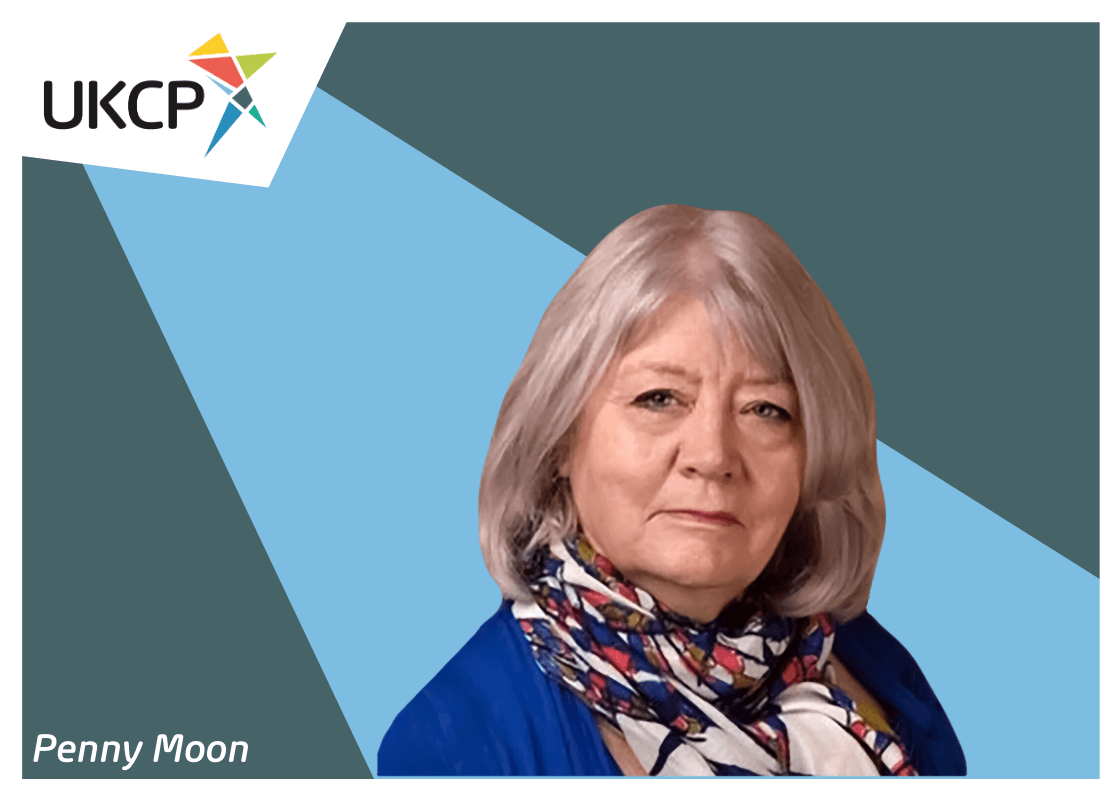Penny Moon
Penny Moon shares her journey to becoming a UKCP accredited psychotherapist.

I approach pupils with a view to optimising their potential
Penny Moon was a teacher in Liverpool before training as a hypno-psychotherapist. Her experience of the education system led her to seek out alternative approaches to meeting the emotional needs of students so they could access the curriculum.
In 1980 I qualified as a yoga teacher, then went on to complete training in psycho-hypnotherapy in 1987. It felt like I had come home; new knowledge was almost familiar and made sense of my meditation practices. Using altered states and guided imagery, stories and myths had been my passion since childhood. Basic counselling skills, neuro-linguistic programming, the impact of food on behaviour – I just couldn’t get enough of it all and how it could be adapted for pupils.
I had previously worked as a special needs teacher in Liverpool, later developing the Early Years Behaviour team for Liverpool City Council. Working in deprived areas, I wanted to enable my pupils to stay in mainstream school and achieve their potential.
I love being a psychotherapist. I feel a little like Sherlock Holmes taking clues from individuals’ stories
Professional services were failing these children by judging them. Clinical practice, social workers’ procedures and protocol seemed to be forensic; the children were there for pathological reasons. Institutional practices appeared to have grown from a single theory, based on Freud, Jung, Klein and later Bowlby and Ainsworth, and didn’t always take into account modalities derived from later understanding of how the mind, body and spirit and brain function.
Some programmes were delivered under the heading of nurture groups based on attachment theory, and suggested that two years are needed for behaviour change. Children often didn’t develop independence and some mothers felt blamed for their children’s behaviour and felt very cross at the suggestion that they hadn’t nurtured their children. Other programmes that used volunteer peripatetic trainee counsellors were judged by the numbers going through the programme, rather than the impact on the child’s performance in school.
Referrals often included a lengthy wait and procedure. Many families have literacy issues and a big brown envelope through the door was not helpful. If they managed to get an appointment and didn’t turn up for some reason (chaotic household, no money for bus, domestic violence, agoraphobia), they might be offered two more appointments, and if they didn’t turn up for them it was straight back to the beginning of the process. If they turned up they were often observed through a glass by professionals who use their judgement to assess and decide treatment.
As a teacher I have a different mindset. It is teachers’ responsibility to deliver education personalised for each pupil. If I said, ‘Hey, Jamie, you don’t learn in the way I teach so hop it,’ I would be rightly sacked. I approach pupils with a view to optimising their potential. I do not look for pathology and the poor outcomes that usually follow diagnosis.
Recognising that each child is dependent on a complex social network is essential. When issues arise in school they are often linked with the situation at home. A toxic combination of mental health, addiction, domestic violence, frequently coupled with literacy problems and all underpinned by poverty are not helpful for people to make a change. An effective intervention should consider the whole family’s needs.
This understanding has led me to develop a support service for children with severe emotional difficulties, which aims to keep their interest, offering practical pointers to give them hope. Children and families are included in all aspects of the programmes and the identification of their unique outcomes is part of the therapeutic approach.
The service is immediate, inclusive and offered without diagnosis, assessments or judgements being made, in a safe space and environment the children are already familiar with: school. The choice of therapeutic techniques is designed to retain interest so that short-term gains will be more likely to continue and children can build upon their successes. The service is integrated with the school’s organisation.
Not all families are able to engage, so I have also developed an in-school programme for children whose parents can’t or won’t work with us. It aims to bring about change in the shortest time possible – six weeks or half a term – to prevent exclusion from school.
However, I’ve learned to never make assumptions that a successful intervention will be welcomed by other services. The establishment and institutions will do their very best to bounce innovation out. I’ve also learned that you can’t help everyone and small gains may be sufficient, but also that sparkling moments are sometimes enough to make a life shift.
I love being a psychotherapist. I feel like Sherlock Holmes taking clues from individuals’ stories and developing helpful narratives that talk to the ‘unconscious’ mind through guided visualisations. I have seen thousands of children and families given hope and moving on in their lives. I feel myself to be one of the luckiest people I know who can apply their knowledge and make their passion into their work.
Piece extracted from the New Psychotherapist Issue 70, Spring 2019.
If you are interested in training to become a therapist, then you can find out more about UKCP accredited training:
Like most websites, we use cookies. If this is okay with you, please close this message or read more about your options.

